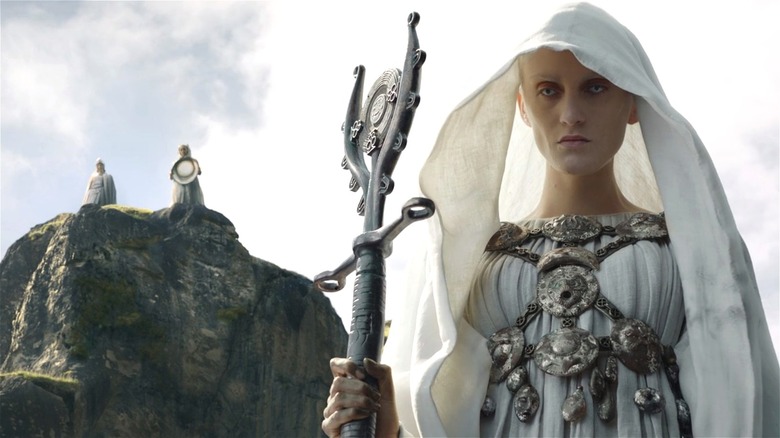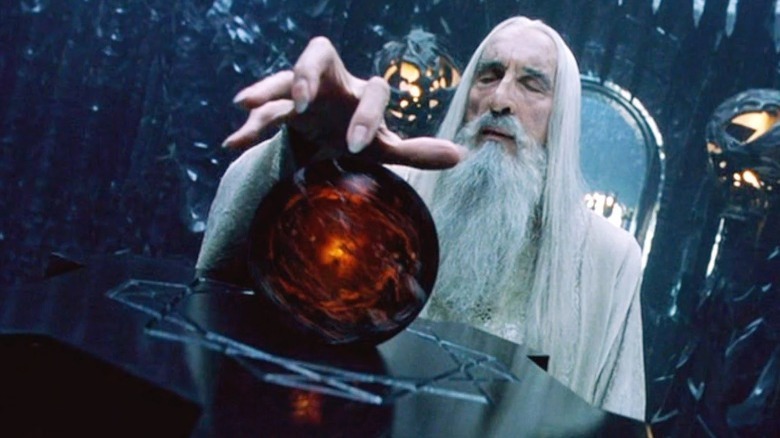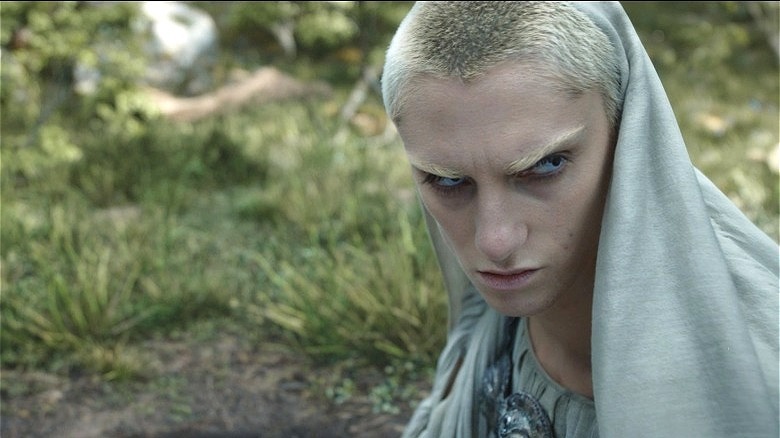Who Are The Rings Of Power's White-Hooded Figures? The Lord Of The Rings' The Cult Of Melkor Explained
This post contains spoilers for episode 5 of "The Lord of the Rings: The Rings of Power."
The slow-burn nature of "Partings," episode 5 of "The Rings of Power," allows the series to ramp up tensions across Middle-earth, as loyalties are tested on the eve of a dark time. The episode opens with The Stranger (Daniel Weyman) and Nori (Markella Kavenagh) having a somber conversation (with Nori doing most of the talking) about good and evil. The identity of The Stranger is one of the core mysteries of the show, as we aren't quite sure whether he's a force of good or evil, but he currently seems capable of both. We cut to the crash site of the Meteor Man, where we see white-robed, hooded figures looking on ominously. Who are these folks?
The group is led by a yet-to-be-identified character (played by Birdie Sisson) whom fans most probably misinterpreted as a Slim Shady-esque shapeshifted form of Sauron. The burning question of who Sauron is permeates every episode ("Partings" even alludes to this when Waldreg mistakes Adar for Sauron), but the forces of the powerful Maia are ever-present in every crevice of Middle-earth. Although the hooded figures remain mysterious, they could be a part of the Cult of Melkor, a religious sect devoted to Morgoth's cause in the Second Age.
The arrival of the cult spells doom for Middle-earth in some ways, as they clearly have an agenda behind their focused interest in the Stranger. Is the Stranger Sauron himself (sorry, Tom Bombadil enthusiasts!), or is he the key to defeating the Lord of the Rings? Here's what is known about the cult of Melkor in J.R.R. Tolkien's works, the influence of religion in the events of the Second Age, and how the group could steer events towards canon inevitability.
How Melkorism and Dark Worship overlap in Tolkien's world
Although religious beliefs are an integral part of existence in Middle-earth history, these expressions of veneration are willful and reaffirmed by a sense of community. In stark contrast, cults in Tolkien's work were vehicles for controlling and manipulating parts of the populace, and the Cult of Melkor is instrumental in widening Sauron's hold over Middle-earth. As Sauron was Morgoth's lieutenant, he would often draw upon his master's reputation to rally allies in his favor. As canon dictates, the Cult of Melkor will play a part in the fall of Númenor, as the group will exploit the human fear of death by manipulating Ar-Pharazôn and his men to sacrifice humans in Melkor's name.
While Melkorism advocated the worship of Morgoth/Melkor, Dark Worship entailed the veneration of Sauron, who believed himself to be Melkor's rightful successor. However, as Sauron heavily utilized Melkor's name to advance his own schemes, Melkorism slowly warped into Dark Worship over the ages, and the two became virtually indistinguishable. In "The Fellowship of the Ring," (which is set during the Third Age), Saruman is not devoted to Melkor but to Sauron, under the egotistic assumption that he can rule alongside the Dark Lord.
Melkor/Sauron's cult is integral to the events of the show, as the group might be Sauron's way of baiting Ar-Pharazôn with a false sense of power/purpose, which will lead to men turning away from the Valar. This perfectly sets up the invasion of Valinor by Ar-Pharazôn and his men, which will lead to the fall of the mighty Númenor. With every episode of "Rings of Power," we see steady darkness spreading throughout Middle-earth, with Sauron orchestrating events from the shadows, using fear and religion-based manipulation tactics to maximum effect.
What do Melkor cultists, uh, believe in?
The white-robed folks being the cult of Melkor makes sense when we inspect the way they're dressed. There's a ceremonial air to their costumes, which emanate a sense of evil primordial magic (basically, the vibes are off). As the meteor crash has been linked to doom several times, it would make sense for the cult to inspect the site and plan accordingly. "The Rings of Power" has retrofitted Tolkien's lore to create fresh conflicts, such as the significance of mithril in preserving the immortality of the elves, which is not a part of canon. As the show is clearly interested in reinventing Tolkien's mythos (which is not a bad thing at all), the Cult of Melkor storyline could play out in a completely different way to accommodate the eventual reveal of The Stranger's role during the Second Age.
That being said, what exactly does the cult believe in, per Tolkien? Based on his "Myths Transformed" and "The Silmarillion," the core tenet of Melkorism is that the Valar's Eru Iluvatar is a false god, while Melkor is powerful beyond measure (please note that these were lies Sauron made up to further his legitimacy among allies and manipulate vulnerable groups). The cult glimpsed in the show could mark the inception of this belief, which became widespread by the Third Age, during which men of Arda worshipped Morgoth.
The cult's presence in the show foreshadows that the Temple of Morgoth will be built in Númenor, where Ar-Pharazôn and his followers will make blood offerings (!) to the Darkness and Melkor himself. This can be Sauron's way of easing into the seat of power unnoticed and leaving entire kingdoms destroyed. The creation of the One Ring would be the final nail in the coffin.


